90% More Chances to Win Projects With Our Estimate!
- Multi-Family Building
- Hotel Building
- Hospital Building
- Warehouse Building
- School & University Building
- High-Rise Building
- Shopping Complex
- Data Center Building
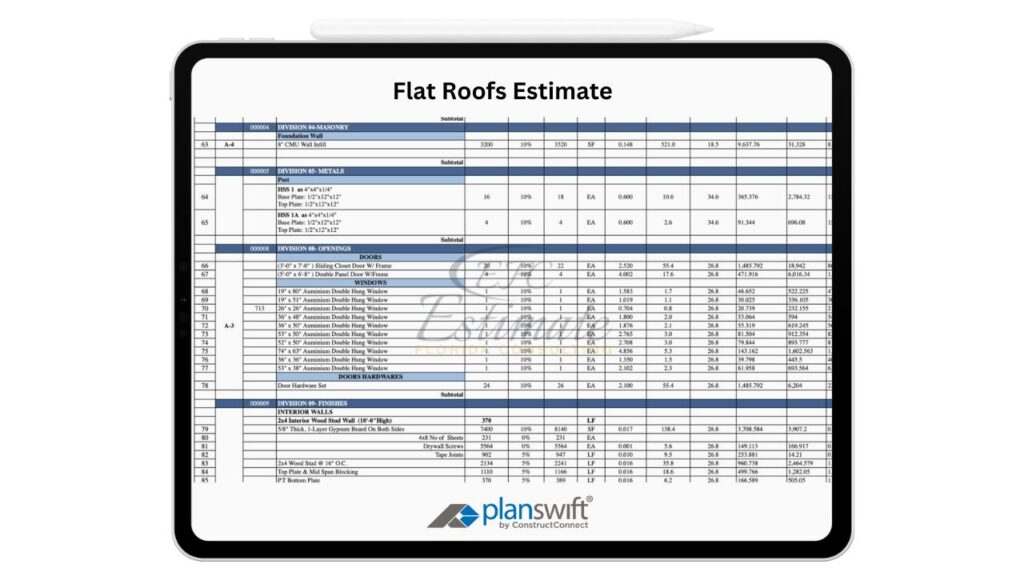
Flat roofs have emerged as a highly sought-after choice for both residential and commercial properties, especially in modern architectural designs. These roofs offer a sleek aesthetic and functional space that can be utilized for various purposes, from rooftop gardens to HVAC units and solar panels. However, estimating the total cost associated with flat roof installation can be challenging due to the myriad of materials, installation techniques, and labor considerations involved. This comprehensive guide aims to provide clarity on the cost factors influencing flat roofing projects, ensuring that property owners and contractors can make informed decisions when budgeting for their roofing needs.
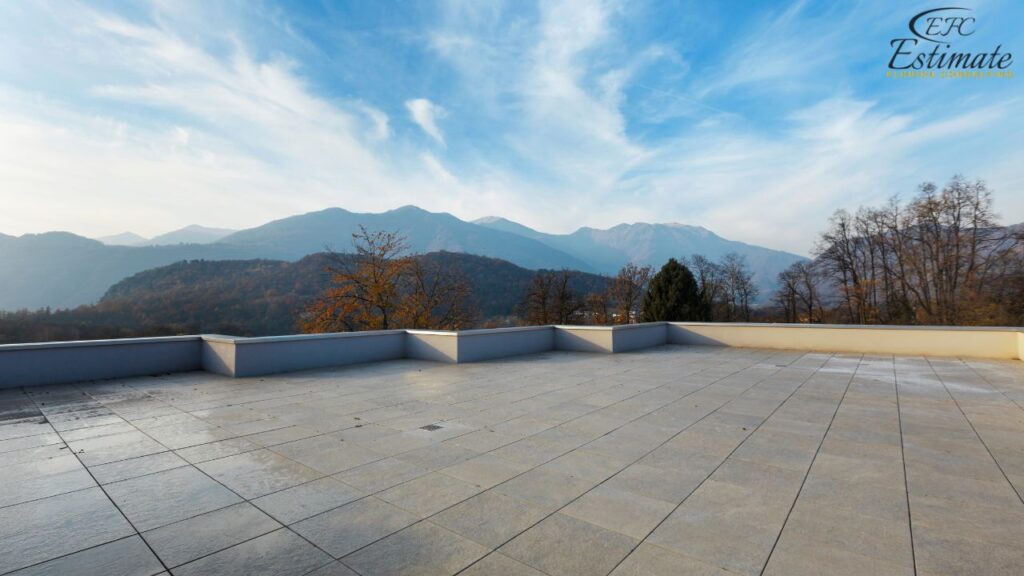
The cost to install a flat roof is typically calculated on a per-square-foot basis, reflecting the diverse range of materials and installation complexities involved. On average, flat roofing costs can range from $8 to $16 per square foot, influenced by the type of material selected, labor costs in the region, and additional features like insulation or drainage systems.
It’s essential to consider that these costs can vary significantly based on local market conditions and the specific characteristics of the building. For instance, urban areas may have higher labor costs due to demand, while rural regions might offer more competitive pricing. Additionally, the complexity of the roof design, including factors like multiple levels or intricate drainage requirements, can further impact overall costs.
Flat Roof Material | Average Cost per Square Foot |
Built-Up Roof (BUR) | $8 – $10 |
Modified Bitumen | $9 – $13 |
EPDM Rubber | $8 – $12 |
TPO Roofing | $10 – $16 |
PVC Roofing | $11 – $18 |
The total cost of installing a flat roof is significantly influenced by its size. Larger projects incur higher material and labor costs due to the increased volume of work. Below is a detailed breakdown of costs for different flat roof sizes.
Roof Size (sq. ft.) | Average Cost (Low-End) | Average Cost (High-End) |
500 sq. ft. | $4,000 | $8,000 |
1,000 sq. ft. | $8,000 | $16,000 |
1,500 sq. ft. | $12,000 | $24,000 |
2,000 sq. ft. | $16,000 | $32,000 |
2,500 sq. ft. | $20,000 | $40,000 |
Choosing the right type of flat roof is crucial for ensuring durability and performance. Various flat roofing systems come with different costs and benefits. Here’s a detailed overview of the most popular flat roof types available:
Built-up roofs (BUR) consist of multiple layers of bitumen (asphalt) and fabric, providing a robust, watertight solution. Typically finished with a layer of gravel or a protective coating, BUR systems are known for their durability and long lifespan. This traditional roofing system requires meticulous installation, which can increase labor costs.
Component | Average Cost |
Bitumen Layers | $8,500 – $15,000 |
Gravel Finish | $3,000 – $6,000 |
Total BUR Installation Cost | $11,500 – $21,000 |
BUR roofs are particularly advantageous in low-slope applications, providing excellent resistance to water infiltration and environmental elements. However, the installation process can be labor-intensive, requiring skilled laborers to ensure that all layers are properly applied and sealed.
Modified bitumen roofs are a modern evolution of BUR systems. They incorporate polymers that enhance flexibility and resistance to extreme weather conditions. This type of roofing is particularly suitable for areas with significant temperature fluctuations, like Florida, where the climate can drastically shift from hot to cool.
Component | Average Cost |
Base Sheet and Membrane Layers | $9,500 – $18,000 |
Torch-On Application | $3,000 – $5,500 |
Total Modified Bitumen Cost | $12,500 – $23,500 |
The installation of modified bitumen involves heating the seams for proper bonding, which requires specialized equipment and trained professionals. This method enhances the roof’s performance, making it an excellent choice for both residential and commercial applications.
EPDM (ethylene propylene diene terpolymer) is a widely used synthetic rubber roofing membrane known for its excellent waterproofing and durability. As one of the most cost-effective flat roofing options, EPDM is especially popular for commercial properties due to its affordability and ease of installation.
Component | Average Cost |
EPDM Membrane | $8,000 – $13,000 |
Sealing and Fastening | $2,500 – $5,000 |
Total EPDM Roofing Cost | $10,500 – $18,000 |
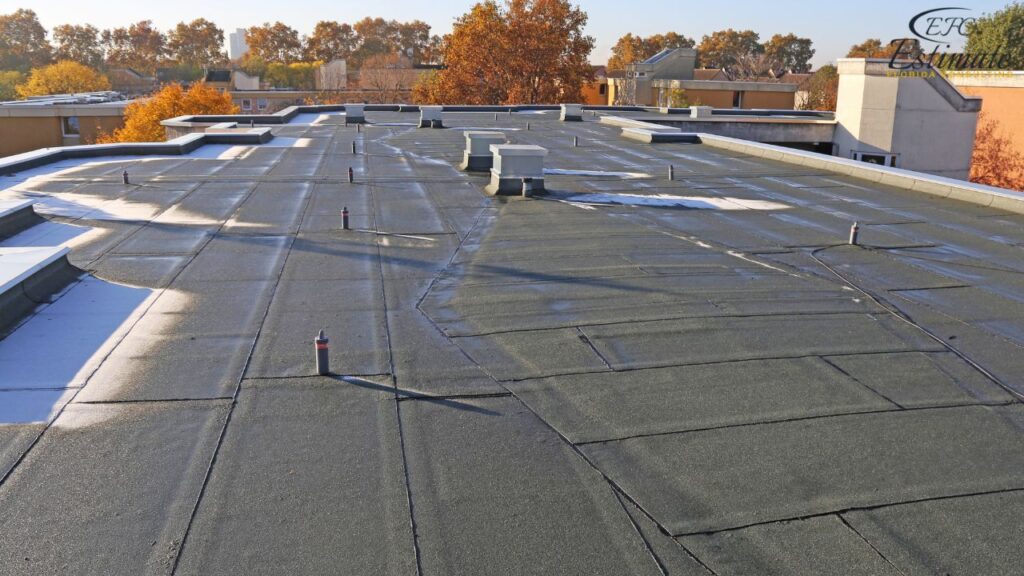
EPDM roofs can last up to 30 years with proper maintenance, making them a sound investment. They are also resistant to UV radiation, which is crucial in sunny climates. However, regular inspections and maintenance are essential to ensure longevity.
TPO (thermoplastic polyolefin) roofing is a single-ply membrane that has gained popularity due to its reflective properties and energy efficiency. TPO is particularly effective in reducing heat absorption, making it an ideal choice for hot climates where cooling costs can be significant.
Component | Average Cost |
TPO Membrane | $10,000 – $18,000 |
Heat Welding | $3,000 – $6,000 |
Total TPO Roofing Cost | $13,000 – $24,000 |
TPO roofs can also be installed quickly and efficiently, reducing labor costs. The heat-welded seams create a watertight seal that enhances durability, making TPO a popular choice for commercial buildings.
PVC (polyvinyl chloride) roofing is a high-performance roofing system known for its excellent resistance to chemicals, fire, and punctures. Its longevity and energy efficiency make it an attractive choice for commercial buildings and industrial applications.
Component | Average Cost |
PVC Membrane | $11,500 – $19,000 |
Sealing and Insulation | $3,500 – $6,500 |
Total PVC Roofing Cost | $15,000 – $25,500 |
PVC roofing systems require skilled installation to ensure proper seam welding, which is critical to preventing leaks. Investing in PVC can yield long-term savings through reduced energy costs and maintenance needs.
Different materials used for flat roofs have varied installation costs. Here’s a deeper look into how material selection impacts overall project costs:
Material Type | Installation Cost (per sq. ft.) | Total Installation Cost (for 1,000 sq. ft.) |
Built-Up Roof (BUR) | $8 – $10 | $8,000 – $10,000 |
Modified Bitumen | $9 – $13 | $9,000 – $13,000 |
EPDM Rubber | $8 – $12 | $8,000 – $12,000 |
TPO Roofing | $10 – $16 | $10,000 – $16,000 |
PVC Roofing | $11 – $18 | $11,000 – $18,000 |
Choosing the right material not only affects initial costs but also has long-term implications for maintenance and energy efficiency. EPDM rubber roofing, for example, offers a cost-effective solution for many homeowners, while PVC provides superior performance in terms of durability and energy efficiency. Balancing upfront costs with long-term savings is essential for making an informed decision.

Installing a flat roof on a residential property involves specific considerations, including design preferences and building regulations. The average cost for residential flat roof installations varies depending on material choice and the complexity of the project.
Material Type | Average Cost (per sq. ft.) | Total Cost for 1,500 sq. ft. Residential Roof |
Built-Up Roof (BUR) | $10 – $12 | $15,000 – $18,000 |
Modified Bitumen | $11 – $15 | $16,500 – $22,500 |
EPDM Rubber | $10 – $14 | $15,000 – $21,000 |
TPO Roofing | $12 – $18 | $18,000 – $27,000 |
PVC Roofing | $13 – $20 | $19,500 – $30,000 |
When estimating costs for residential flat roofs, it’s essential to factor in additional components like insulation and drainage systems. Many homeowners opt for energy-efficient materials that can significantly reduce long-term energy costs, making them a worthwhile investment despite higher upfront prices.
Commercial flat roofs are often larger and more complex than residential roofs, which can affect installation costs. Due to the unique requirements of commercial buildings, including load-bearing capabilities and fire resistance, the costs can vary widely.
Material Type | Average Cost (per sq. ft.) | Total Cost for 5,000 sq. ft. Commercial Roof |
Built-Up Roof (BUR) | $9 – $12 | $45,000 – $60,000 |
Modified Bitumen | $10 – $14 | $50,000 – $70,000 |
EPDM Rubber | $9 – $13 | $45,000 – $65,000 |
TPO Roofing | $11 – $17 | $55,000 – $85,000 |
PVC Roofing | $12 – $19 | $60,000 – $95,000 |
Commercial flat roofs often require specialized installation techniques to comply with building codes and safety standards. It’s also essential to consider the ongoing maintenance needs of commercial roofs, as they may have additional wear and tear from rooftop equipment such as HVAC units. Selecting durable materials can minimize long-term costs and maintenance efforts.
overall comfort within the building. The cost of insulation varies based on the type of insulation chosen and the size of the roof.
Insulation Type | Average Cost (per sq. ft.) | Total Cost for 1,000 sq. ft. |
Rigid Board Insulation | $1.50 – $3.50 | $1,500 – $3,500 |
Spray Foam Insulation | $2.00 – $4.00 | $2,000 – $4,000 |
Fiberglass Batt Insulation | $0.90 – $2.00 | $900 – $2,000 |
Investing in quality insulation helps regulate temperature, reducing heating and cooling costs significantly. Spray foam insulation, while more expensive, offers superior thermal performance and moisture resistance, making it ideal for flat roofs in humid climates like Florida.
Effective drainage systems are vital for the longevity of flat roofs, as standing water can lead to severe damage. The cost of drainage systems depends on the complexity and materials used.
Drainage System Type | Average Cost (per unit) | Total Cost for Installation |
Interior Drains | $1,000 – $2,000 | $1,000 – $2,500 |
Scuppers | $300 – $600 | $300 – $800 |
Gutter Systems | $5 – $10 (per ft.) | $500 – $1,500 |
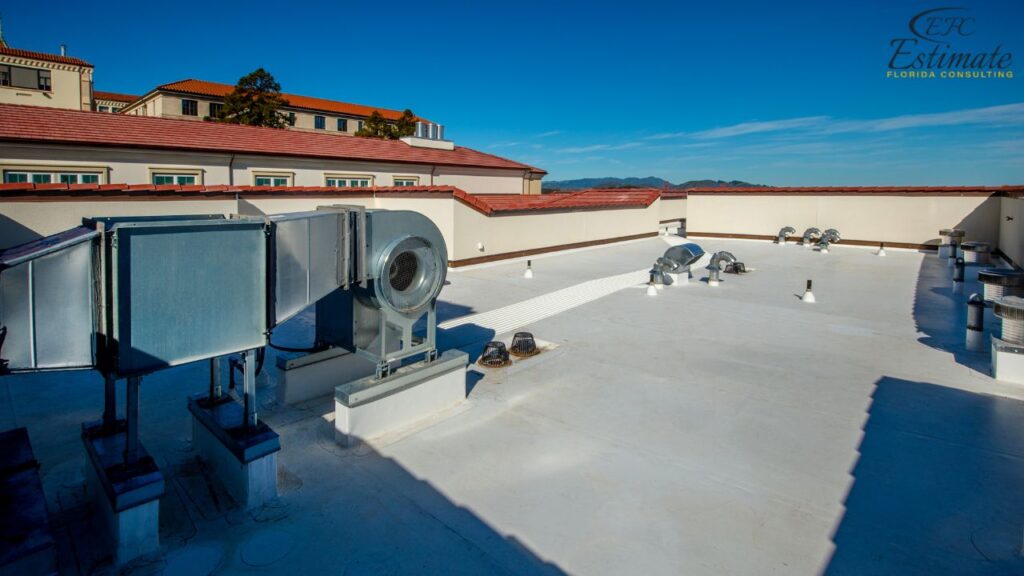
Installing a proper drainage system prevents water accumulation, reducing the risk of leaks and structural damage. It’s crucial to ensure that the drainage system is correctly integrated during the installation phase to guarantee optimal performance.
Regular maintenance is essential for extending the lifespan of flat roofs. The costs associated with maintenance and repairs can vary based on the roof’s condition and the specific work needed.
Maintenance Type | Average Cost | Frequency |
Annual Inspection | $200 – $500 | Yearly |
Minor Repairs | $250 – $750 | As needed |
Major Repairs | $1,000 – $5,000 | Every 5-10 years |
Scheduled inspections can identify potential issues before they escalate into costly repairs. Routine maintenance typically includes clearing debris, checking for leaks, and ensuring proper drainage functionality.
The lifespan of a flat roof can vary widely based on material quality and maintenance practices. Understanding the lifespan can help homeowners plan for future costs associated with replacement.
Material Type | Lifespan (Years) | Replacement Cost (for 1,000 sq. ft.) |
Built-Up Roof (BUR) | 15 – 30 | $10,000 – $20,000 |
Modified Bitumen | 15 – 20 | $12,000 – $22,000 |
EPDM Rubber | 20 – 30 | $10,000 – $18,000 |
TPO Roofing | 20 – 30 | $13,000 – $25,000 |
PVC Roofing | 20 – 30 | $15,000 – $28,000 |
Planning ahead for roof replacement can prevent unexpected expenses. Property owners should budget for eventual replacement costs, factoring in potential increases in material and labor prices over time.

Flat roofs can have both positive and negative environmental impacts. On one hand, they can be equipped with green technologies like solar panels and rooftop gardens, which contribute to energy efficiency and biodiversity. On the other hand, if not properly designed, they may contribute to urban heat islands due to their materials and lack of vegetation.
Utilizing energy-efficient materials and incorporating green roofs can significantly enhance a flat roof’s environmental performance. Property owners should consider sustainable options that mitigate energy consumption and reduce the roof’s carbon footprint.
Several types of flat roof systems exist, each with unique costs, durability, and maintenance requirements. Common systems include Built-Up Roofing (BUR), Modified Bitumen, EPDM (Ethylene Propylene Diene Monomer), and TPO (Thermoplastic Polyolefin). Each material comes with its own benefits and drawbacks. For instance, EPDM is known for its durability and affordability, while TPO is recognized for its energy efficiency. Evaluating these options helps homeowners make informed decisions based on their specific needs and budget.
Flat roofs are versatile, but they come with their own set of pros and cons. On the positive side, they provide additional usable space and easier access for maintenance. However, they are more prone to water pooling, which can lead to leaks if not adequately addressed. Homeowners should consider their lifestyle, climate, and potential maintenance requirements when deciding on a flat roof.
Energy efficiency is a crucial consideration when selecting a flat roofing system. Materials such as reflective coatings can significantly reduce heat absorption, leading to lower energy bills. In Florida, where summer temperatures can soar, investing in energy-efficient roofing options can lead to substantial savings over time.
Flat roofs can encounter various issues, including ponding water, blistering, and cracking. Ponding water occurs when drainage systems are insufficient, leading to water accumulation. This can be mitigated by ensuring proper installation and regular maintenance checks. Blistering can result from trapped moisture and can be resolved through timely repairs.
Homeowners should be aware of these common issues to address them promptly and maintain their roofs effectively.
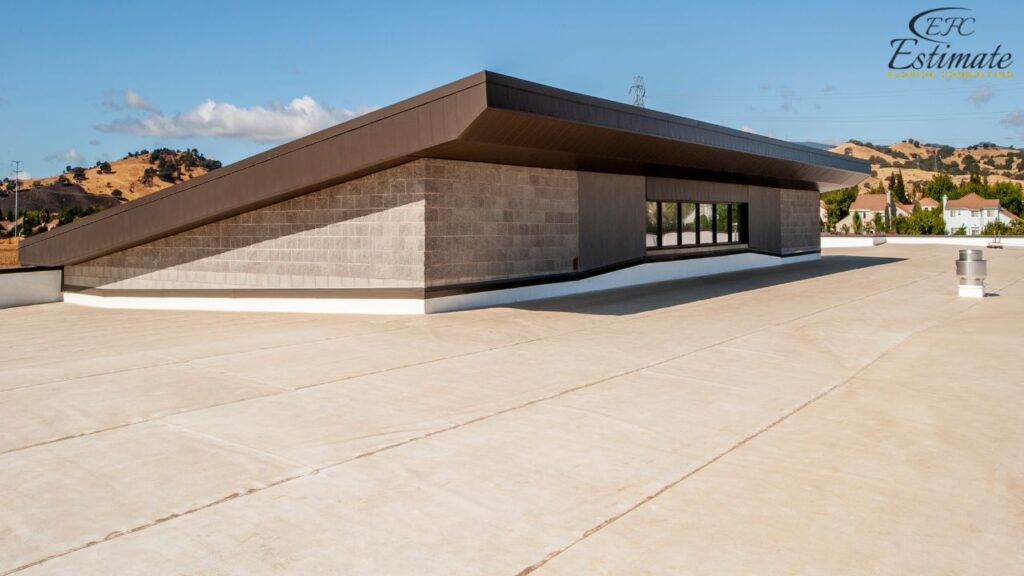
Regular maintenance is crucial for the longevity of flat roofs, especially in Florida’s diverse climate. Seasonal checks should include inspections for debris accumulation, drainage effectiveness, and any signs of wear or damage. Clearing gutters and drains, along with checking for potential leaks or weak spots, can prevent significant problems down the line. Engaging a professional for annual maintenance can ensure that any issues are caught early.
Knowing when to repair versus replace a flat roof can save homeowners significant costs. Minor repairs, such as sealing small leaks or patching cracks, are usually less expensive than a full replacement. However, if the roof is nearing the end of its lifespan, investing in a new roof may be more cost-effective in the long run. Understanding the signs that indicate repair versus replacement can help homeowners make sound financial decisions.
When choosing materials for a flat roof, energy performance ratings should be a key consideration. Different roofing materials have varying levels of energy efficiency, affecting heating and cooling costs. Homeowners can benefit from researching and selecting materials with higher energy ratings, ultimately leading to long-term savings.
Reflective roof coatings are an excellent investment for flat roofs, especially in sunny climates like Florida. These coatings help reflect sunlight away from the building, reducing heat absorption and lowering indoor temperatures. This leads to decreased reliance on air conditioning systems, which can significantly cut energy costs. In addition to energy savings, reflective coatings can extend the lifespan of the roof by protecting it from UV damage.
Insurance premiums for properties with flat roofs can be higher due to perceived risks associated with these structures. Insurers often consider factors such as the material used, the installation quality, and the roof’s age when determining coverage costs. Homeowners should discuss their options with insurance providers to understand how a flat roof might impact their premiums and coverage.
In the event of damage, knowing how to navigate the insurance claims process for flat roofs can be invaluable. Documenting all damage with photographs and keeping records of repairs and maintenance can support a claim. Homeowners should familiarize themselves with their insurance policies and maintain open communication with their insurance adjusters to ensure a smooth claims process.
The flat roofing industry is continually evolving, with new technologies and materials being developed to improve performance and durability. Innovations such as green roofing systems, which incorporate vegetation, are becoming more popular for their environmental benefits and energy efficiency. Additionally, advancements in material science are yielding more resilient roofing options that can better withstand extreme weather conditions.
Sustainability is becoming a key consideration in construction, and flat roofs are no exception. Homeowners can choose from various eco-friendly materials and practices, such as using recycled materials or integrating solar panels. Sustainable flat roofing not only helps reduce environmental impact but can also result in long-term savings on energy costs.
Climate change presents new challenges for flat roofs, including increased temperatures, heavy rainfall, and severe storms. Homeowners must consider how these factors influence their roofing choices and maintenance strategies. Choosing resilient materials and designs that can withstand these changing conditions is essential for protecting their investments.
Flat roofs offer a modern and practical roofing solution for many homeowners and businesses. Understanding the various factors influencing installation costs, maintenance requirements, and the latest trends in flat roofing can empower property owners to make informed decisions. By prioritizing energy efficiency, sustainable practices, and regular maintenance, homeowners can maximize the lifespan of their flat roofs and achieve long-term cost savings.
The cost to install a flat roof typically ranges from $8 to $16 per square foot. This estimate can vary based on factors such as the roofing material chosen, labor costs in your region, and any additional features like insulation or drainage systems.
The type of material significantly impacts the overall cost of installation. Here’s a quick overview of average costs per square foot for various materials:
Larger flat roofs generally incur higher material and labor costs. For example, the estimated costs for a 1,000 sq. ft. flat roof can range from $8,000 to $16,000, while a 2,500 sq. ft. roof can cost between $20,000 and $40,000.
Consider the following factors:
In addition to installation costs, consider:
The lifespan of a flat roof varies by material:
Quality insulation helps regulate temperature, which can significantly reduce heating and cooling costs. Options like spray foam insulation offer superior thermal performance, making them ideal for humid climates.
To enhance the environmental performance of your flat roof, consider:
Regular maintenance is key to extending the lifespan of your flat roof. Schedule annual inspections and address minor repairs promptly to prevent them from escalating into major issues.
To estimate the total cost:
At Estimate Florida Consulting, we offer detailed cost estimates across all major trades, ensuring no part of your project is overlooked. From the foundation to the finishing touches, our trade-specific estimates provide you with a complete and accurate breakdown of costs for any type of construction project.

We take pride in delivering accurate, timely, and reliable estimates that help contractors and builders win more projects. Our clients consistently praise our attention to detail, fast turnaround times, and the positive impact our estimates have on their businesses.
Estimate Florida Consulting has helped us win more bids with their fast and accurate estimates. We trust them for every project!

Submit your project plans, blueprints, or relevant documents through our online form or via email.
We’ll review your project details and send you a quote based on your scope and requirements.
Confirm the details and finalize any adjustments to ensure the estimate meets your project needs.
Receive your detailed, trade-specific estimate within 1-2 business days, ready for your project execution.

561-530-2845
info@estimatorflorida.com
Address
5245 Wiles Rd Apt 3-102 St. Pete Beach, FL 33073 United States
561-530-2845
info@estimatorflorida.com
Address
5245 Wiles Rd Apt 3-102 St. Pete Beach, FL 33073 United States
All copyright © Reserved | Designed By V Marketing Media | Disclaimer